ISUFST–Ehime University Joint Academic Exchange & Research Symposium
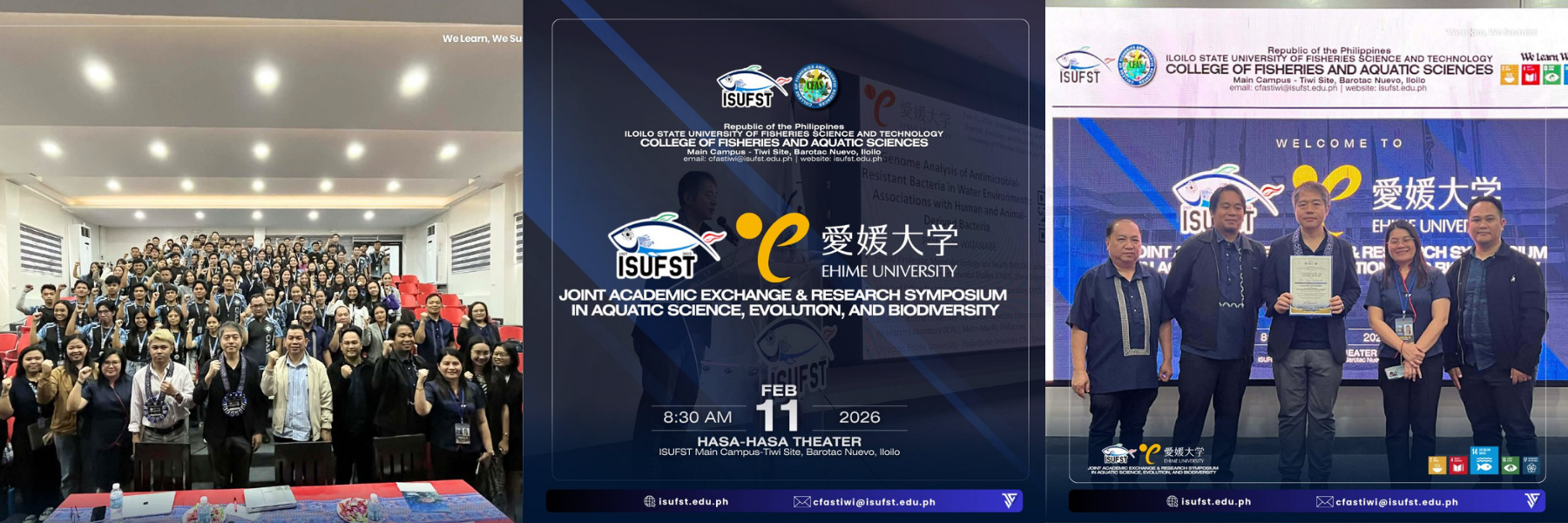
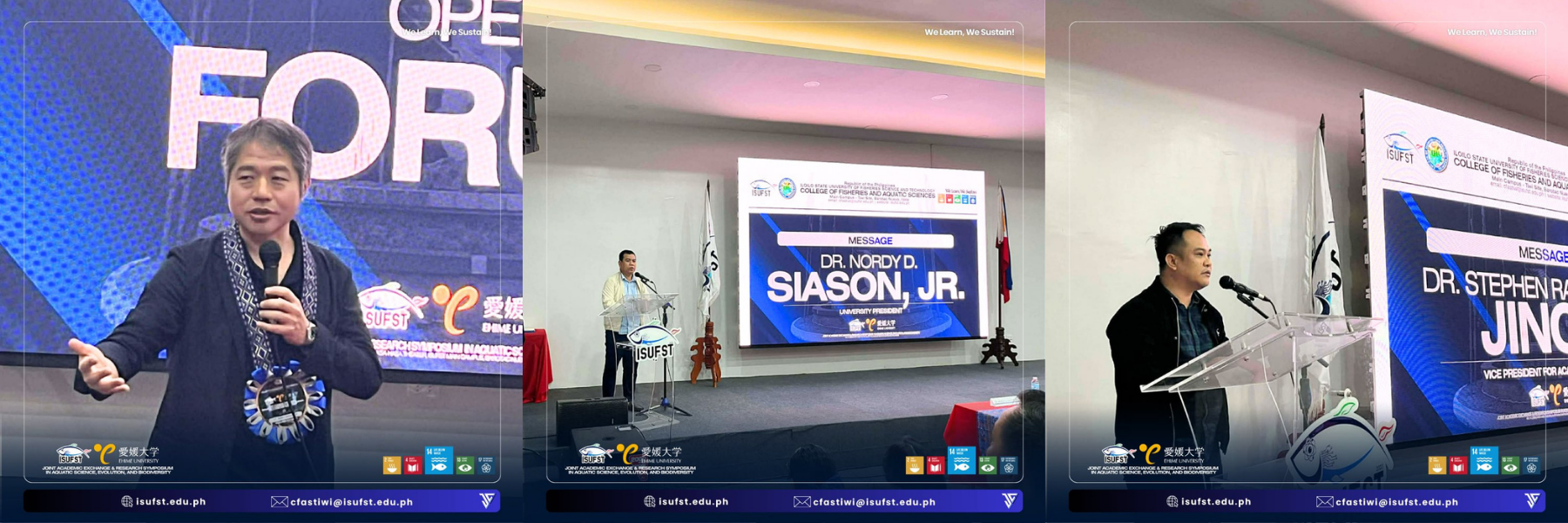
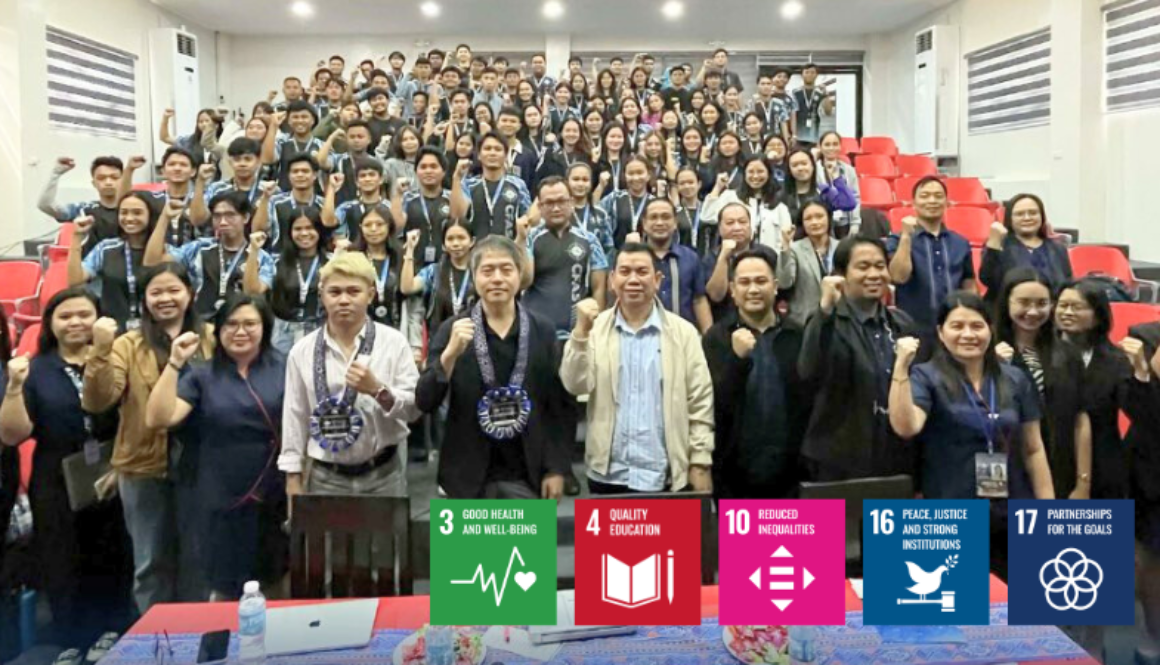


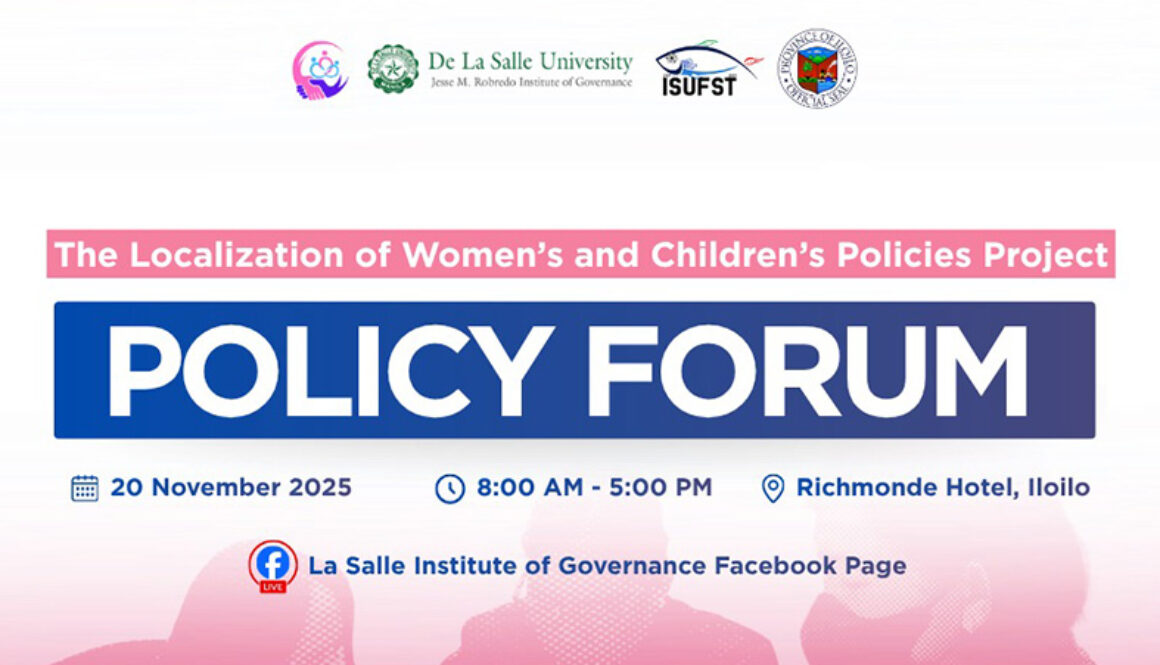
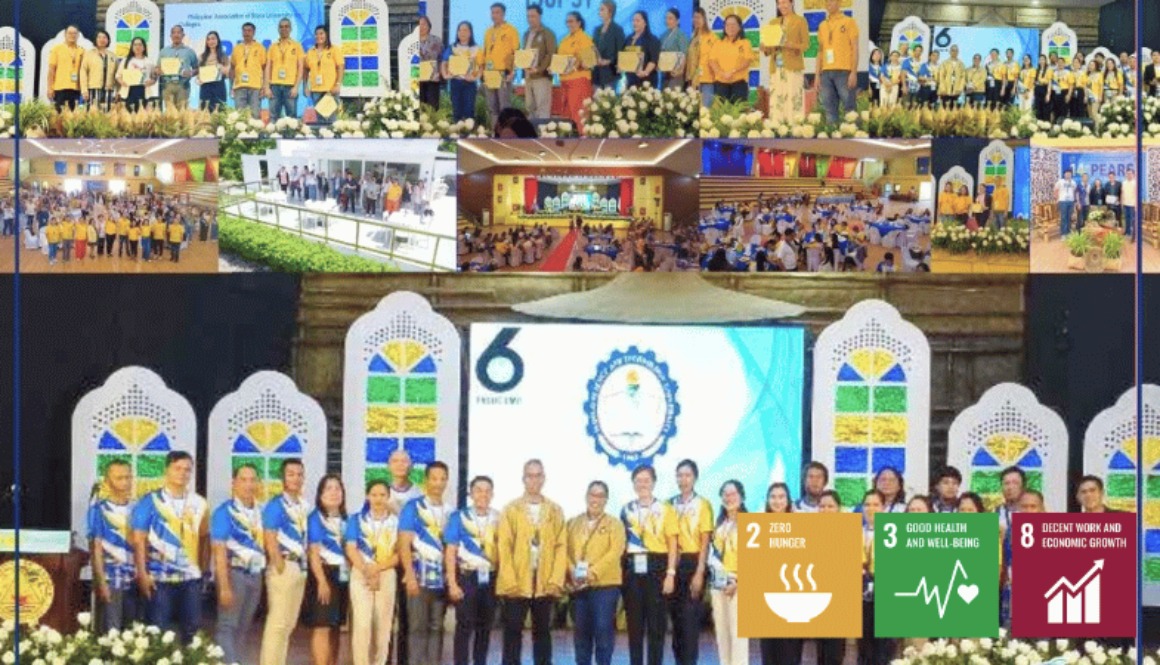

SIBALOM, ANTIQUE—The Iloilo State University of Fisheries Science and Technology (ISUFST) proudly brought home several awards from the 14th PASUC VI–Extension Managers’ Council (EMC) Regional Symposium and General Assembly, hosted by the University of Antique on September 30 to October 2, 2025.
Carrying the theme “Extension Beyond Boundaries: Strengthening Impact Through Innovation, Inclusion, and Integration,” the gathering brought together SUC leaders and extension workers across Western Visayas to highlight projects that touch lives beyond the campus.

At the forefront was Dr. Myrna P. Prudente, Dean of the College of Agriculture, who won Best Extension Paper in the Agri-Fishery, Food, and Environment category for her “Good Agricultural Practices Extension Project (GAPSEP).” “Our farmers need not only knowledge but also tools they can apply immediately in their fields. This project is about making science real and useful in their daily lives,” Prudente said.

Dr. Pia P. Paz, Dean of the College of Management, was named Best Presenter for her “Health Education and Livelihood Program for Indigenous People.” She described extension work as empowerment, adding, “Programs like these are proof that extension work is not just service—it is empowerment.”

Dr. Donabelle D. Mongao of the Dumangas Campus also shone, winning Best Paper Presenter and Second Place Extension Paper for her study on “Revisiting the Marketability of Dumangas District Jail’s Bangus Kropek.” “Even in the most unexpected places, entrepreneurship can bring dignity and hope,” Mongao shared.

Rounding off ISUFST’s victories was Dr. John Vincent Manalo of Barotac Nuevo, who placed Second in the Entrepreneurship and Circular Economy category for his work on community-based business models.

The ISUFST team was led by Dr. Joana Paula B. Biñas of the Office of Extension Services and Development, and included representatives from Tiwi, Barotac Nuevo, Dingle, Dumangas, and San Enrique campuses. Biñas credited the collective win to teamwork and the strong support of ISUFST President Dr. Nordy D. Siason Jr., VPAA Dr. Joan M. Belga, and VPAD Dr. Johnny B. Dolor.
The event highlighted how state universities are advancing the UN Sustainable Development Goals, particularly Zero Hunger (SDG 2), Good Health and Well-being (SDG 3), and Decent Work and Economic Growth (SDG 8). For ISUFST, the wins reaffirm its mission to deliver research and extension programs that uplift communities and build resilience. (Ian Galupar/Herman Lagon/PAMMCO)
#isufstisdafirst #isufstcommunity #isufst #pammcostoriesthatmatter


An ISUFST undergraduate and a faculty member earned Best Research Presenter honors at the 4th International Conference on Biodiversity and Climate Change (IConBaCC 2025), held September 25–26 at Misamis University in a hybrid format. Their achievements advanced work aligned with the conference theme, “Sustainable Peace with Nature: A Global Commitment towards Net Zero.”
Arlene May A. Linacero (BS Fisheries III) was cited onsite in the Environmental Impacts and Climate Change category for her study, “Pathogenicity of Outbreak-Derived Aeromonas hydrophila on Nile Tilapia (Oreochromis niloticus) through Immersion Challenge.” She was advised by Prof. Jason O. Albances and accompanied by Dr. John Christian B. Salarza. Her research supports healthier aquaculture systems—vital to food security and directly aligned with SDG 14 (Life Below Water) and SDG 13 (Climate Action).

Assistant Professor II Rico Ian D. To-ong, who presented virtually, earned Best Presenter honors in the Political Responses category for his study, “Value Chain Analysis of the Invasive Fish Sarotherodon melanotheron in the 4th District of Iloilo, Philippines.” His work provides policy- and market-oriented insights on managing invasive species, directly connecting to SDG 12 (Responsible Consumption and Production) and SDG 14 (Life Below Water).
IConBaCC is a biennial platform hosted by Misamis University in collaboration with regional and international partners. It brings together researchers, practitioners, students, and stakeholders to share solutions on biodiversity and climate challenges. Accepted papers may also be considered for publication in the Journal of Multidisciplinary Studies (JMDS).
The recognitions reflect ISUFST’s outcomes-focused training and partnerships consistent with SDG 17 (Partnerships for the Goals), SDG 14 (Life Below Water), and the university’s commitment to quality education and community impact.
Established in 1957, the Iloilo State University of Fisheries Science and Technology (ISUFST) is the country’s first and only fisheries university. With five campuses, it offers programs in fisheries, marine biology, education, management, industrial technology, agriculture, information technology, and office administration. The university is ISO 9001:2015–certified, AACCUP-accredited since 1998, a multi-awardee of CHED, and a debut entrant in the 2024 Times Higher Education Impact Rankings, cited across five SDGs.
(John Christian B. Salarza and Herman Lagon / PAMMCO)
#isufstisdafirst #isufstcommunity #isufst #pammcostoriesthatmatter


The College of Education (CoEd) of the Iloilo State University of Fisheries Science and Technology (ISUFST) Main Campus launched its first-ever Research Symposium this Wednesday, September 17, 2025, at the Hasá Hasá Theatre and Library AVR, Main Campus–Tiwi Site, Barotac Nuevo, Iloilo, gathering 280 senior education students and their professors to strengthen competencies in data gathering and research practices.
The day-long activity featured simultaneous sessions on quantitative and qualitative research led by faculty experts and invited resource speakers. In the quantitative track named after statistician Ronald Fisher, Dr. Ramir Torreces opened with a discussion on preparing valid, reliable, and quality research instruments and materials. He was followed by Dr. Ronilo Aponte, who underscored the importance of conducting ethical and inclusive quantitative studies, and Dr. Jeena Torred, who guided students in choosing appropriate statistical tools to ensure meaningful results. The sessions emphasized rigor in design, ethics, and analysis, equipping participants with practical approaches to improve their thesis work.
Meanwhile, in the qualitative track under Norman Denzin’s banner, Prof. Christine Deocampo and Dr. Rex Paulino shared strategies in pro-actively and efficiently preparing for the conduct of their study, while CoEd Dean Matthew Lasap highlighted effective fieldwork and tips for conducting ethical and inclusive studies in diverse contexts. Prof. Bonifacio Zamora Jr. concluded with insights on collating, organizing, and preparing qualitative data for analysis. Together, the sessions drew attention to the “garbage in, garbage out” principle, stressing that quality input data is essential for producing valuable research outcomes.
Vice President for Academic Affairs Dr. Joan M. Belga graced the program, emphasizing the administration’s commitment to mentoring student researchers. “Research is not just compliance. It is our way of shaping educators who can think critically and respond meaningfully to community needs,” Belga said during her remarks.
Dean Lasap, prime mover of the initiative, said the symposium was born out of a concern that many students were engaging in qualitative studies without sufficient preparation. “We wanted to make sure our students are not only guided by their advisers but also equipped as a college with one mind and one heart toward research,” Lasap said.
Lasap added that the activity also sought to foster a common language among faculty and students in approaching data collection and analysis. He noted that collaboration and shared understanding were vital in enhancing student learning experiences.

Program Highlights
The symposium was divided into two parallel tracks, named after scholars Ronald Fisher and Norman Denzin, covering both quantitative and qualitative research. Sessions tackled instrument validation, ethical considerations, statistical tool selection, and effective fieldwork techniques. Workshop tasks allowed participants to apply principles directly to their ongoing theses.
The symposium was designed as the first part of a two-phase activity, with the second phase on data analysis targeted at the end of the year. For now, students are scheduled to conduct their research from September to October, with final defenses set for the first week of December.
The event also addressed concerns on research formatting and stylistic issues in thesis writing. Dr. Armando Katalbas was tasked to discuss proper template use and clarify stylistic elements to ensure uniformity across submissions.
Belga, who personally visited both session venues, commended the college’s effort to align with ISUFST’s vision of fostering innovation and quality education. “By guiding our students at this stage, we are also advancing the university’s thrusts under the Sustainable Development Goals, particularly SDG 4 on Quality Education,” she said.
The symposium forms part of ISUFST’s broader strategy to cultivate a stronger research culture across its five campuses. As the country’s first and only fisheries university, ISUFST has earned recognition for excellence in teaching, extension, and research, including recent awards from the Commission on Higher Education (CHED) and a debut in the 2024 Times Higher Education Impact Rankings for SDG achievements. (Arniel Clarite, Herman Lagon, Edeline Joy Brito/PAMMCO)
#isufstisdafirst #isufstcommunity #isufst #pammcostoriesthatmatter


Iloilo State University of Fisheries Science and Technology (ISUFST) researcher Instructor Jessa Alico and her team secured Second Place in the Regional Science, Technology, and Innovation Week (RSTW) Pitching Session 2025 held yesterday, September 10, at Robinsons Roxas, Capiz, with their innovation Auto-OMP (Automated Oyster Mushroom Production).
The award-winning research, developed by ISUFST’s College of Agriculture in partnership with the College of Computer Studies, was led and presented by Instr. Alico with co-researchers Instr. Rezeld Alarva, Instr. Dave Allan Tagacay, and Engr. Katherine Padilla. The team is developing an automated system that takes the fuss out of mushroom farming so communities and agri firms can raise yields, reduce losses, and grow income in a sustainable way. It hopes to respond to what farmers face on the ground and to the push for resilient, inclusive, sustainable practices.
“Our technology was inspired by a reverse pitching event where I realized automation could help solve major challenges in mushroom production,” Alico said, adding, “After the event, I collaborated with IT colleagues to bring the idea to life. It wasn’t easy, but we pushed through because we believe this tech can greatly benefit both the community and education.” Armed with the hope to serve not just agricultural students but also the wider community, she intimated that the team’s next steps are “to protect the technology and conduct thorough testing, with the hope that by 2029, farmers can already begin using it.”
Organized through RAISE Tech Ventures 2025, the pitching event gathered 14 universities alongside government agencies across Region VI. It culminated in the presentation of research innovations after a series of capacity-building sessions hosted at the University of the Philippines Visayas–Miagao, University of Antique, Iloilo Science and Technology University, and Capiz State University.
Central Philippine University (CPU) placed first, while Northern Iloilo State University (NISU) placed third. Certificates and cash prizes celebrated their research-powered solutions and the teams behind them.
As DOST Region VI puts it, RSTW 2025’s theme—“Siyensya, Teknolohiya at Inobasyon: Kabalikat sa Matatag, Maginhawa at Panatag na Kinabukasan”—shows how science can lift neighborhoods now and make them more resilient for the future. “Events like this connect innovation to adoption, and adoption to economic growth,” said DOST-VI Regional Director and member of the Board of Regents of ISUFST, Engr. Rowen Gelonga.
Auto-OMP advances UN goals where it counts: food security under SDG 2, agripreneurship and jobs under SDG 8, and sustainable production under SDG 12. ISUFST, the country’s only state fisheries university, is steadily building SDG-aligned work into classes, labs, and outreach—part of its roadmap to be a top Southeast Asian research university by 2030.
The achievement of Alico and her team join a string of ISUFST honors in research, global linkages, and community programs, strengthening its promise to deliver solutions that help small businesses and barangays thrive. (Photo credit is given to COAG ISUFST San Enrique/Herman Lagon/PAMMCO)
#isufstisdafirst #isufstcommunity #isufst #pammcostoriesthatmatter


On stormy days in Iloilo, when the sea looks restless and the shoreline brims with stories, four ISUFST students chose to chase answers hidden in the smallest of places—inside the gut of an oyster. For 20-year-olds Melody Vaughn Ferrer, Johnas Arellado, Romeo Theodore Golez, and Arlene May Linacero, what began as curiosity soon grew into the kind of work that could change lives, especially for the fisherfolk who depend on tilapia farming for survival. Together, with the quiet but steady mentorship of Prof. Jason Albances, they became a research team unlike any other.
Just days ago, they made history. Named Top 10 National Finalists in the BPI-DOST Innovation Awards, the young researchers secured ₱60,000 with the chance to turn it into ₱150,000 if they rise into the Top 3. For ISUFST, it is the first taste of national acclaim at this level and nature. For the students, it is fuel and validation rolled into one—evidence that an oyster-born idea from Iloilo can swim, and thrive, in national waters.

The Team Behind the Breakthrough
Their story is a grounded picture of ISDA in motion—research done with integrity, for social justice, through disciplined work, toward academic excellence.
Melody, a BFAR scholar from Guimaras, traced her passion to growing up close to the sea. “At first, I just wanted to help in research,” she said. “But along the way, I realized how much it fueled my drive to persevere and deepen my passion for discovery.” Her journey from high school science fairs to oyster-based probiotics reveals not just persistence but a love for science that mirrors the mission of Iloilo State University of Fisheries Science and Technology (ISUFST), the only fisheries university in the country, to raise globally competitive graduates who lead with responsibility.
Johnas, a third-year student from Anilao, Iloilo, admitted he wasn’t ready for research at first. But when he learned microbes from oysters might help fight fish disease, he was hooked. “The idea that something small could save you from creating this large change also delighted me,” he recalled with a soft smile. Outside the lab, he unwinds with music and his food and consumptive fish—proof his curiosity swims past textbooks into daily life.
For Romeo, the project was almost a calling. “The chance to study probiotics from oysters was something I never thought possible,” he said. Manga and anime may give him comfort after long days, but in the lab he became one of the group’s anchors. He repeated technical procedures tirelessly until they worked, his honesty about failures matched by his joy in every small success. That mix of grit and humility made him both steady worker and natural communicator—traits that soon earned him the role of the team’s buyer, marketer, and outside link.
Arlene, a BFAR and LGU coop scholar from Cabatuan, Iloilo, was drawn in by her love for freediving and swimming. “Being underwater connects me to the world we study,” she reflected. As the team’s organizer, she kept those late nights from going off the rails. “What I love is our balance—if one of us misses something, someone else calls it out.” It was she who first proposed probiotics as their research direction, setting the course for everything that followed.
What set this group apart was how their roles naturally complemented each other. Melody took on the less glamorous tasks—documentation, filing letters, cleaning up after experiments. “It’s the dirty work that keeps everything moving,” she joked. Johnas, the problem-solver, handled daily water changes and jury-rigged solutions when lab resources ran low. Romeo became the communicator, doing market surveys and purchases while still grinding through lab work. Arlene managed the group’s schedules and communication, never letting momentum stall. Each role was different, but together they made the research possible.

Setbacks, Support, and Small Wins
The sacrifices they poured into the study weren’t just late nights—they were entire seasons of their young lives. Melody remembers entering the lab at five in the morning and leaving near midnight, sometimes skipping meals just to record tilapia behavior. Johnas recalled the never-ending challenge of securing clean water, especially during weekends or holidays when supply was unreliable. Romeo spoke of equipment that wasn’t fit for their needs, forcing them to adapt. Arlene admitted she often pushed for extra experiments even when energy was low.
Their adviser, Prof. Albances, put it plainly: “I watched them trade sleep, meals, and weekends for this work. We lost three runs to contamination, ran out of clean water, made do with tools that weren’t built for us. Each time, they didn’t sulk—they changed the method and came back. That’s science: care and perseverance for a higher cause.”
For them, science wasn’t neat—it was chaotic, sleepless, and stubborn. “The worst part? Those marathon lab days—no lunch, no breaks,” Melody shared. “The best? That moment the data finally clicked and every hour felt worth it.” Romeo added, recalling when the oyster probiotics first checked the pathogen: “That tiny win kept us going.”
Even steady Arlene confessed to jitters. “I’m kinda confident, just trying not to jinx it.” She carried on, letting the results speak for themselves “The whole process really matters—it proves ISUFST can hold its own in fisheries research.”
Their adviser watched the grind and the glow-ups. “Seeing them after a failed experiment was the hardest,” Albances admitted. He’d ease the room with snacks some days, push harder on others—“kung gis-a, ga latigo ‘ko sa ila (sometimes, I have to ‘crack the whip,’)” he joked. No spoon-feeding, just guided grit. “Their edge is resilience. They kept finding ways to improve.”
It helped that ISUFST itself stood behind them. With the school’s biolab facilities, the students learned to maximize every resource, embodying the university’s guiding principle of empowerment. “Even if the facilities aren’t always perfect, the environment pushes us to innovate,” Arlene said. For Johnas, the experience confirmed his foundation: “ISUFST gave me not just aquaculture knowledge but the chance to do real research early.”
What made their achievement even sweeter was its history. For the first time ever, a group of ISUFST students broke into the top 10 of this national innovation competition. “They are making history for the college,” Albances proudly said. For him, their recognition proved that even as third years—who began this project as sophomores—they could stand shoulder to shoulder with students from more resource-rich universities.
Behind every trial was also a circle of support. Melody, a first-generation student, said her family’s faith gave her courage. Johnas admitted his strict but supportive parents, and especially his sister, pushed him to persevere. Romeo, coming from a family of teachers and seafarers, was grateful for a household that valued discipline and service. Arlene said simply, “My parents supported me all the way.” Beyond families, the school provided labs, vehicles, and even small comforts when needed. “All we asked for, the school supported,” Albances stressed.

Oyster Probiotics for Tilapia: Impact on Fisherfolk
The team’s study, anchored on samples from Brgy. Palaciawan in Barotac Nuevo, directly answered farmers’ questions: “How do we stop the disease?” Aeromonas shrugs off antibiotics, putting small tilapia farmers at risk. By using bay-ad (oysters) as a low-cost probiotic, the students proved science can come from local waters—not pricey imports. If scaled up, this could lower costs, protect fish stocks, and give stability to families whose survival hinges on aquaculture.
Their project drew funding from DOST–PCAARRD with Dr. Mary May Payne as special project head—and from ISUFST. They finished the study with a cost kept relatively manageable, thanks to school equipment and shared resources. The research, part of their undergraduate thesis, has already set the stage for further work. In December 2025, ISUFST professor Dr. Payne will accompany the team to present their full paper internationally, by which time Albances will already be in Japan at Tokyo University of Marine Science and Technology for his PhD studies. “The results are in place for presentation,” he confirmed, hinting at an even bigger stage ahead.
NFRDI and PCAARRD stand for National Fisheries Research and Development Institute and Philippine Council for Agriculture, Aquatic and Natural Resources Research and Development, respectively. While BPI, BFAR, and DOST mean Bank of the Philippine Islands, Bureau of Fisheries and Aquatic Resources, and Department of Science and Technology.

Why This Matters to Families
What makes their work remarkable is how it stretches beyond the lab. “It’s not just about fish,” Melody said. “It’s about the people who depend on them.” By finding a natural, oyster-based alternative to antibiotics, the team points to safer tilapia on the table, steadier incomes for fisherfolk, and healthier seas—right in step with SDGs 2 (Zero Hunger), 3 (Good Health and Well-Being), and 14 (Life Below Water).
Romeo put it more plainly: “Our project can help a lot of small fish farmers by producing a natural way to reduce disease and boost fish health.” Johnas added, “This doesn’t just help aquaculture—it helps fisherfolk families whose livelihoods depend on it.” Arlene saw it as both livelihood and environmental protection: “It’s about supporting local communities through science.”
Looking ahead, each student carries not just dreams but lessons etched by the journey. Melody, an athlete before she was a researcher, learned that sacrifice is the price of discovery. Johnas discovered that asking for help is not weakness but strength. Romeo reflected that diligence and balance are vital: “Ask questions. The world promises more if you’re just keen to look for answers that solve problems for the marginalized.” Arlene distilled it into discipline: “Always manage your time, list the work, distribute it well—but never forget to rest.”
For Prof. Albances, the lesson was simple but profound: interest and grit can push students far beyond the curriculum. “They are only fresh third-years now, but they’ve learned so much more than what’s inside the classroom,” he said. He continues to give free Friday lectures to second-years, inviting them into the same journey. What began as a deal to help senior students in the lab grew into a culture of curiosity that, in his words, “can change futures.”
At its heart, this story is more than science—it’s possibility realized. When curiosity is tended, when resilience finds its moment, and when young scientists are trusted, change begins. The future of discovery lives not just in experiments but in the hands of dreamers, the tables of fisherfolk, and the steady guidance of teachers who let them soar.
“As a university, this directly advances the SDGs and affirms ISUFST’s leadership in marine science,” said Dr. Nordy Siason. “Four students and a mentor are walking away with more than data—they carry grit, service, and hope.”
He put it with a fisher’s plain wisdom and an ISUFST nod: “ISDA isn’t just fish—it’s our promise of shared progress. Care for the fish, feed families, strengthen communities. From an oyster’s gut to the nation’s tables—that’s how science should feed the future.” (Herman Lagon/PAMMCO)











